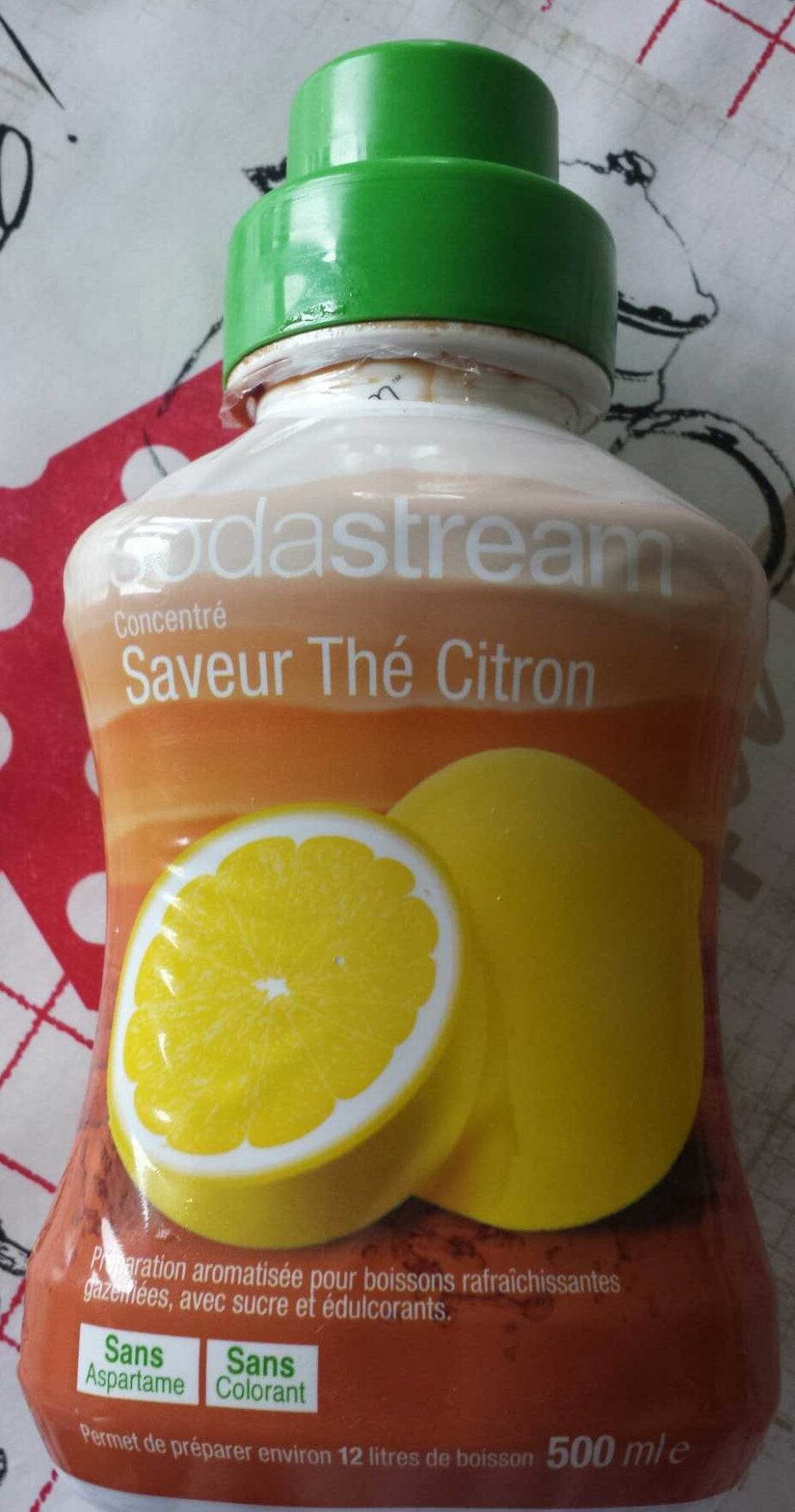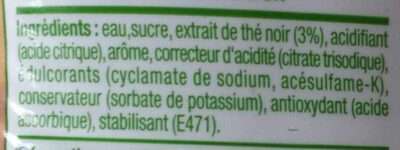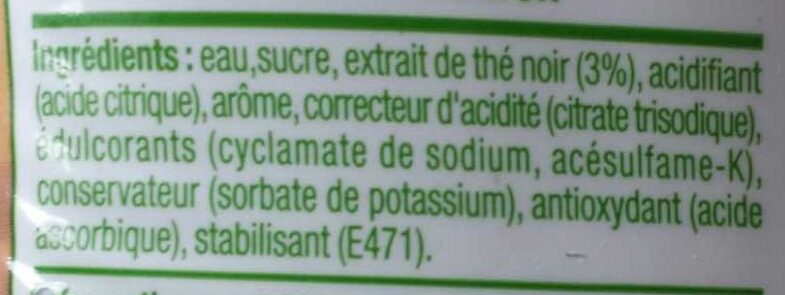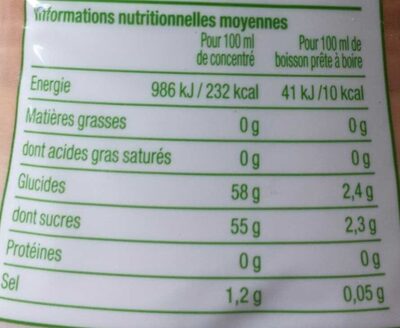Help us make food transparency the norm!
As a non-profit organization, we depend on your donations to continue informing consumers around the world about what they eat.
The food revolution starts with you!
Concentré saveur thé citron - Sodastream - 500ml
Concentré saveur thé citron - Sodastream - 500ml
This product page is not complete. You can help to complete it by editing it and adding more data from the photos we have, or by taking more photos using the app for Android or iPhone/iPad. Thank you!
×
Barcode: 8718692614888 (EAN / EAN-13)
Common name: Préparation aromatisée pour boissons rafraîchissantes gazéifiées, avec sucre et édulcorants
Quantity: 500ml
Brands: Sodastream
Categories: Beverages, Syrups, Artificially sweetened beverages, Flavoured syrups, fr:Boissons concentrées, fr:Préparations pour boissons
Labels, certifications, awards: No aspartame, No colorings, With sweeteners
Manufacturing or processing places: Israël
Stores: Carrefour
Countries where sold: France
Matching with your preferences
Health
Ingredients
-
17 ingredients
: Eau, sucre, extrait de thé noir (3 %), acidifiant (acide citrique), arôme, correcteur d'acidité (citrate trisodique), édulcorants (cyclamate de sodium, acésulfame-k)), conservateur (sorbate de potassium), antioxydant (acide ascorbique), stabilisant (E471).
Food processing
-
Ultra processed foods
Elements that indicate the product is in the 4 - Ultra processed food and drink products group:
- Additive: E471 - Mono- and diglycerides of fatty acids
- Additive: E950 - Acesulfame k
- Additive: E952 - Cyclamic acid and its Na and Ca salts
- Ingredient: Flavouring
- Ingredient: Sweetener
Food products are classified into 4 groups according to their degree of processing:
- Unprocessed or minimally processed foods
- Processed culinary ingredients
- Processed foods
- Ultra processed foods
The determination of the group is based on the category of the product and on the ingredients it contains.
Additives
-
E202 - Potassium sorbate
Potassium sorbate (E202) is a synthetic food preservative commonly used to extend the shelf life of various food products.
It works by inhibiting the growth of molds, yeast, and some bacteria, preventing spoilage. When added to foods, it helps maintain their freshness and quality.
Some studies have shown that when combined with nitrites, potassium sorbate have genotoxic activity in vitro. However, potassium sorbate is generally recognized as safe (GRAS) by regulatory authorities.
-
E330 - Citric acid
Citric acid is a natural organic acid found in citrus fruits such as lemons, oranges, and limes.
It is widely used in the food industry as a flavor enhancer, acidulant, and preservative due to its tart and refreshing taste.
Citric acid is safe for consumption when used in moderation and is considered a generally recognized as safe (GRAS) food additive by regulatory agencies worldwide.
-
E331 - Sodium citrates
Sodium citrate: Sodium citrate may refer to any of the sodium salts of citrate -though most commonly the third-: Monosodium citrate Disodium citrate Trisodium citrateThe three forms of the salt are collectively known by the E number E331. Sodium citrates are used as acidity regulators in food and drinks, and also as emulsifiers for oils. They enable cheeses to melt without becoming greasy.Source: Wikipedia
-
E331iii - Trisodium citrate
Sodium citrate: Sodium citrate may refer to any of the sodium salts of citrate -though most commonly the third-: Monosodium citrate Disodium citrate Trisodium citrateThe three forms of the salt are collectively known by the E number E331. Sodium citrates are used as acidity regulators in food and drinks, and also as emulsifiers for oils. They enable cheeses to melt without becoming greasy.Source: Wikipedia
-
E471 - Mono- and diglycerides of fatty acids
Mono- and diglycerides of fatty acids (E471), are food additives commonly used as emulsifiers in various processed foods.
These compounds consist of glycerol molecules linked to one or two fatty acid chains, which help stabilize and blend water and oil-based ingredients. E471 enhances the texture and shelf life of products like margarine, baked goods, and ice cream, ensuring a smooth and consistent texture.
It is generally considered safe for consumption within established regulatory limits.
-
E950 - Acesulfame k
Acesulfame potassium: Acesulfame potassium - AY-see-SUL-faym-, also known as acesulfame K -K is the symbol for potassium- or Ace K, is a calorie-free sugar substitute -artificial sweetener- often marketed under the trade names Sunett and Sweet One. In the European Union, it is known under the E number -additive code- E950. It was discovered accidentally in 1967 by German chemist Karl Clauss at Hoechst AG -now Nutrinova-. In chemical structure, acesulfame potassium is the potassium salt of 6-methyl-1‚2,3-oxathiazine-4-3H--one 2‚2-dioxide. It is a white crystalline powder with molecular formula C4H4KNO4S and a molecular weight of 201.24 g/mol.Source: Wikipedia
-
E952 - Cyclamic acid and its Na and Ca salts
Cyclamic acid: Cyclamic acid is a compound with formula C6H13NO3S. It is included in E number "E952". Cyclamic acid is mainly used as catalyst in the production of paints and plastics, and furthermore as a reagent for laboratory usage.The sodium and calcium salts of cyclamic acid are used as artificial sweeteners under the name cyclamate.Source: Wikipedia
Ingredients analysis
-
May contain palm oil
Ingredients that may contain palm oil: E471
-
Vegan status unknown
Unrecognized ingredients: Sodium citrate
-
Vegetarian status unknown
Unrecognized ingredients: Sodium citrate
-
Details of the analysis of the ingredients
: Eau, sucre, extrait de thé noir 3%, acidifiant (acide citrique), arôme, correcteur d'acidité (citrate trisodique), édulcorants (cyclamate de sodium, acésulfame-k), conservateur (sorbate de potassium), antioxydant (acide ascorbique), stabilisant (e471)- Eau -> en:water - vegan: yes - vegetarian: yes - ciqual_food_code: 18066 - percent_min: 27.5 - percent_max: 94
- sucre -> en:sugar - vegan: yes - vegetarian: yes - ciqual_proxy_food_code: 31016 - percent_min: 3 - percent_max: 48.5
- extrait de thé noir -> en:black-tea-extract - vegan: yes - vegetarian: yes - ciqual_food_code: 18154 - percent_min: 3 - percent: 3 - percent_max: 3
- acidifiant -> en:acid - percent_min: 0 - percent_max: 3
- acide citrique -> en:e330 - vegan: yes - vegetarian: yes - percent_min: 0 - percent_max: 3
- arôme -> en:flavouring - vegan: maybe - vegetarian: maybe - percent_min: 0 - percent_max: 3
- correcteur d'acidité -> en:acidity-regulator - percent_min: 0 - percent_max: 3
- citrate trisodique -> en:sodium-citrate - percent_min: 0 - percent_max: 3
- édulcorants -> en:sweetener - percent_min: 0 - percent_max: 3
- cyclamate de sodium -> en:e952 - vegan: yes - vegetarian: yes - percent_min: 0 - percent_max: 3
- acésulfame-k -> en:e950 - vegan: yes - vegetarian: yes - percent_min: 0 - percent_max: 1.5
- conservateur -> en:preservative - percent_min: 0 - percent_max: 3
- sorbate de potassium -> en:e202 - vegan: yes - vegetarian: yes - percent_min: 0 - percent_max: 3
- antioxydant -> en:antioxidant - percent_min: 0 - percent_max: 3
- acide ascorbique -> en:e300 - vegan: yes - vegetarian: yes - percent_min: 0 - percent_max: 3
- stabilisant -> en:stabiliser - percent_min: 0 - percent_max: 3
- e471 -> en:e471 - vegan: maybe - vegetarian: maybe - from_palm_oil: maybe - percent_min: 0 - percent_max: 3
Nutrition
-
Average nutritional quality
⚠ ️Warning: the amounts of fiber and of fruits, vegetables and nuts are not specified, their possible positive contribution to the grade could not be taken into account.This product is considered a beverage for the calculation of the Nutri-Score.
Positive points: 0
- Proteins: 0 / 5 (value: 0, rounded value: 0)
- Fiber: 0 / 5 (value: 0, rounded value: 0)
- Fruits, vegetables, nuts, and colza/walnut/olive oils: 0 / 10 (value: 0, rounded value: 0)
Negative points: 4
- Energy: 2 / 10 (value: 41, rounded value: 41)
- Sugars: 2 / 10 (value: 2.3, rounded value: 2.3)
- Saturated fat: 0 / 10 (value: 0, rounded value: 0)
- Sodium: 0 / 10 (value: 20, rounded value: 20)
The points for proteins are counted because the negative points are less than 11.
Nutritional score: (4 - 0)
Nutri-Score:
-
Nutrient levels
-
Fat in low quantity (0%)
What you need to know- A high consumption of fat, especially saturated fats, can raise cholesterol, which increases the risk of heart diseases.
Recommendation: Limit the consumption of fat and saturated fat- Choose products with lower fat and saturated fat content.
-
Saturated fat in low quantity (0%)
What you need to know- A high consumption of fat, especially saturated fats, can raise cholesterol, which increases the risk of heart diseases.
Recommendation: Limit the consumption of fat and saturated fat- Choose products with lower fat and saturated fat content.
-
Sugars in high quantity (2.3%)
What you need to know- A high consumption of sugar can cause weight gain and tooth decay. It also augments the risk of type 2 diabetes and cardio-vascular diseases.
Recommendation: Limit the consumption of sugar and sugary drinks- Sugary drinks (such as sodas, fruit beverages, and fruit juices and nectars) should be limited as much as possible (no more than 1 glass a day).
- Choose products with lower sugar content and reduce the consumption of products with added sugars.
-
Salt in high quantity (0.05%)
What you need to know- A high consumption of salt (or sodium) can cause raised blood pressure, which can increase the risk of heart disease and stroke.
- Many people who have high blood pressure do not know it, as there are often no symptoms.
- Most people consume too much salt (on average 9 to 12 grams per day), around twice the recommended maximum level of intake.
Recommendation: Limit the consumption of salt and salted food- Reduce the quantity of salt used when cooking, and don't salt again at the table.
- Limit the consumption of salty snacks and choose products with lower salt content.
-
-
Nutrition facts
Nutrition facts As sold
for 100 g / 100 mlPrepared
for 100 g / 100 mlCompared to: fr:preparations-pour-boissons Energy 986 kj
(232 kcal)41 kj
(42 kcal)+11% Fat 0 g 0 g -100% Saturated fat 0 g 0 g Carbohydrates 58 g 2.4 g +14% Sugars 55 g 2.3 g +13% Fiber ? ? Proteins 0 g 0 g -100% Salt 1.2 g 0.05 g +218% Fruits‚ vegetables‚ nuts and rapeseed‚ walnut and olive oils (estimate from ingredients list analysis) 0 % ?
Environment
-
Eco-Score B - Low environmental impact
⚠ ️Select a country in order to include the full impact of transportation.The Eco-Score is an experimental score that summarizes the environmental impacts of food products.→ The Eco-Score was initially developped for France and it is being extended to other European countries. The Eco-Score formula is subject to change as it is regularly improved to make it more precise and better suited to each country.Life cycle analysis
-
Average impact of products of the same category: A (Score: 100/100)
Category: Syrup (mint, strawberries flavouredetc.), with sugar diluted in water
Category: Syrup (mint, strawberries flavouredetc.), with sugar diluted in water
- PEF environmental score: 0.02 (the lower the score, the lower the impact)
- including impact on climate change: 0.10 kg CO2 eq/kg of product
Stage Impact Agriculture
53.2 %Processing
7.4 %Packaging
27.4 %Transportation
7.4 %Distribution
3.2 %Consumption
1.4 %
Bonuses and maluses
-
Missing origins of ingredients information
Malus: -5
⚠ ️ The origins of the ingredients of this product are not indicated.
If they are indicated on the packaging, you can modify the product sheet and add them.
If you are the manufacturer of this product, you can send us the information with our free platform for producers.
-
Packaging with a medium impact
Malus: -10
Shape Material Recycling Impact Bottle Plastic High
Eco-Score for this product
-
Impact for this product: B (Score: 79/100)
Product: Concentré saveur thé citron - Sodastream - 500ml
Life cycle analysis score: 100
Sum of bonuses and maluses: -15
Final score: 79/100 (The score of products with non-recyclable and non-biodegradable packaging materials is capped at 79 (grade B).)
-
Carbon footprint
-
Equal to driving 0.1 km in a petrol car
10 g CO² per 100g of product
The carbon emission figure comes from ADEME's Agribalyse database, for the category: Syrup (mint, strawberries flavouredetc.), with sugar diluted in water (Source: ADEME Agribalyse Database)
Stage Impact Agriculture
33.0 %Processing
19.9 %Packaging
26.0 %Transportation
18.6 %Distribution
2.2 %Consumption
0.3 %
Packaging
-
Packaging with a medium impact
-
Packaging parts
Bottle (Plastic)
-
Packaging materials
Material % Packaging weight Packaging weight per 100 g of product Plastic
-
Transportation
-
Origins of ingredients
Missing origins of ingredients information
⚠ ️ The origins of the ingredients of this product are not indicated.
If they are indicated on the packaging, you can modify the product sheet and add them.
If you are the manufacturer of this product, you can send us the information with our free platform for producers.Add the origins of ingredients for this product Add the origins of ingredients for this product
Report a problem
-
Incomplete or incorrect information?
Category, labels, ingredients, allergens, nutritional information, photos etc.
If the information does not match the information on the packaging, please complete or correct it. Open Food Facts is a collaborative database, and every contribution is useful for all.










